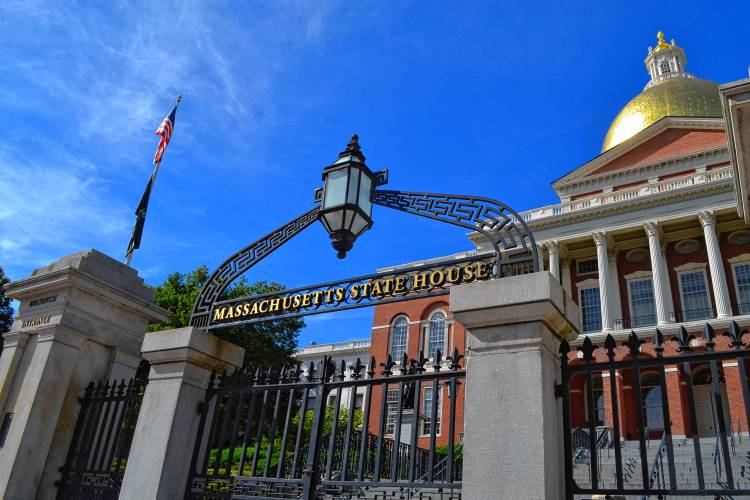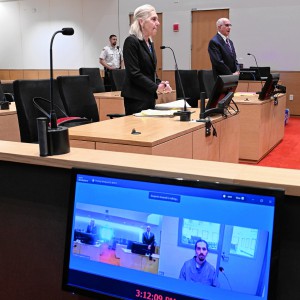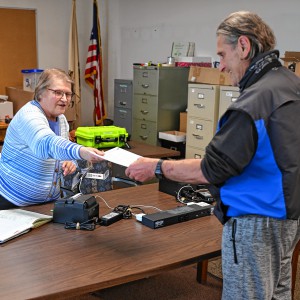Doula bill heads to hearing

The Massachusetts State House in Boston
| Published: 09-18-2023 5:00 PM |
This Wednesday, the Joint Committee on Health Care Financing will host a hearing for a bill that could vastly improve access to doula services.
The hearing will take place on Sept. 20 from 10 a.m. to 3 p.m. for Doula Bill H 1240/ S 782: An Act Relative to Medicaid Coverage for Doula Services. Other bills relating to health equity will also be discussed. Advocates in western Massachusetts and beyond are hopeful the bill will be signed into law in the near future.
“With the stars aligning and MassHealth being supportive, it gives a much better chance of getting this bill passed,” said state Rep. Lindsay Sabadosa, D-Northampton.
Sabadosa is the sponsor of the bill along with state Sen. Liz Miranda, D-Suffolk.
“There has been a lot of progress in a short number of years,” Sabadosa continued.
Doulas do not provide medical care, but look out for the emotional, physical and informational pieces of birth, allowing for birthers to have support and the ability to make more informed decisions.
People in this field have shifted away from gendered language and call people getting these services birthers or clients.
The bill has four goals, which advocates say would change the accessibility to doula services statewide.
Article continues after...
Yesterday's Most Read Articles
 Work on Pinedale Avenue Bridge connecting Athol and Orange to resume
Work on Pinedale Avenue Bridge connecting Athol and Orange to resume
 PHOTOS: Enchanted Orchard Renaissance Faire at Red Apple Farm
PHOTOS: Enchanted Orchard Renaissance Faire at Red Apple Farm
 Lawyer argues Joshua Hart’s 2018 conviction for Orange murder had inconsistent verdicts
Lawyer argues Joshua Hart’s 2018 conviction for Orange murder had inconsistent verdicts
 UMass basketball: Minutemen nab another transfer in Arizona State forward Akil Watson
UMass basketball: Minutemen nab another transfer in Arizona State forward Akil Watson
 ‘Arrive Alive’ shows Athol High School students the dangers of impaired driving
‘Arrive Alive’ shows Athol High School students the dangers of impaired driving
 Orange Selectboard declares armory as surplus property
Orange Selectboard declares armory as surplus property
The first point of the bill would require MassHealth, the Massachusetts Medicaid program, to cover doula services. Erika Laquer, an Easthampton-based professional birth doula and childbirth educator since 2006, explained that writing these services into law would safeguard them from being taken away and create a push for private health insurance to follow suit. Forty percent of births in the state involve people who have MassHealth.
“That is a large amount of people who could potentially have doulas,” said Martha Hoffman, a doula based out of Northampton.
Secondly, the bill would work to expand the workforce and diversity of the doulas in the state by providing assistance for training to become a doula. This would add regional equity, Sabadosa told the Recorder, by creating trust funds for doula training for people to work with underserved communities.
The bill also amends the Patient Bill of Rights to give birthers the right to have a doula in the room at the hospital while giving birth. Finally, the bill creates a Doula Advisory Committee to give feedback about the bill, This would make sure, “the program actually works,” Sabadosa said.
“I am so excited this bill has come to fruition. It has been many years of collaboration,” said Jacqueline Tuttle, Deerfield-based birth and postpartum doula for her company, Yellow Rose Birth Services.
The Massachusetts Doula Coalition, a state-wide organization, drafted the bill and has worked to educate the public about, the importance of its passage.
In past legislative sessions when the bill was introduced “it never makes it to the finish line,” Sabadosa explained. It has gone through the Public Health Committee and Public Health Finance Committee. This year in the Health Care Financing Committee, Sabadosa thinks the bill has a better chance of passing.
When the bill was first introduced in 2019, MassHealth was in support of the concept, but concerned about the expense of adding doulas as a covered service. Now, four years later, MassHelath has come out in support of the bill and released a statement that it would pay a flat rate of $700 for labor and delivery support and hourly rates for perinatal visits up to $800.
“This is a huge moment for the history of birth in our state,” Tuttle said.
Research has found many positive effects of having doulas and the Recorder published an article earlier this year about those benefits.
Doulas typically charge anywhere from $0 to $2000 for their services depending on the level of experience. Many offer sliding scale pricing, where birthers can choose a price they feel is affordable.
While there are proven positive outcomes to having a doula present at a birth, it is often inaccessible for people due to the cost.
“We need to make sure the most vulnerable people in our state are able to access services, and providers are willing to provide services at the rate they are paid,” Sabadosa said. “That is across the board and also specific to doulas.”
The doulas and Sabadosa explained this region is a “hot bed” for doula services.
Sabadosa said while at a public health hearing, she thought it was common knowledge to know doulas can help cut down on maternal mortality rates, referring to her own birthing experience where doulas often came up in conversation.
“It was fascinating to find out in other parts of the state that was not the case,” she said.
Doctors in the region are typically pro-doula and know how to work with a doula present during labor, Tuttle said.
Most of the doulas in the area are involved in the networking and community-building platform Green River Doula Network, which can be found at greenriverdoulas.org.
This network offers training for doulas and can point clients to specialists, as well as people who can help with lactation, doula abortion services and childbirth education, according to Kayla Chatterton, doula, sexual reproductive health educator and certified placenta encapsulation specialist through her company Wombans Wellness. The network fundraises to pay for the cost of free doula services to low-income families, and has offered two this past year.
The network was inactive during COVID-19 and recently relaunched, rebuilding the doula community. Other regions also use doula networks to allow for a collaboration of providers on one platform.
Hoffman, a board member for the Green River Doula Network, explained one of the biggest problems doulas in the area run into is finding clients. Hoffman said that there are many people having babies, but some do not know what a doula is. Most doulas in the area, they explained, have to supplement their career with other jobs.
“Lack of consistency is definitely a little part of the job, but it does seem to be a slower pace out here,” Hoffman said.
While advocates are rejoicing over the bill’s potential passage, many have come out against the rates MassHealth has offered.
“There are two truths,” Sabadosa said. “The rate is too low, the second truth is it is higher than any other state.”
The bill itself does not set a rate, because inflation would cause those to change. Instead, MassHealth has set its own rates for the services, which can change over time.
Tuttle explained she is concerned there is a flat rate for labor and birth services. She said many births, including inductions and first births, can last a long time and there is no overtime offered with the current language of the bill.
Lacquer explained for people beginning their careers in this region, this could be adequate payment, but it is concerning that the same rates across the state do not account for other factors.
“If people are continuously undercharged they will burn out,” Tuttle said.
She is also concerned this would not pay for travel, which can be a barrier for people living in rural areas, and perinatal visits can only last up to 90 minutes, which she thinks is not enough time.
Bella Levavi can be reached at 413-930-4579 or blevavi@recorder.com

 $700K debt exclusion would fund repairs to Raymond Hall
$700K debt exclusion would fund repairs to Raymond Hall Erving voters say ‘no’ to $3.7M debt exclusion
Erving voters say ‘no’ to $3.7M debt exclusion More than 130 arrested at pro-Palestinian protest at UMass
More than 130 arrested at pro-Palestinian protest at UMass